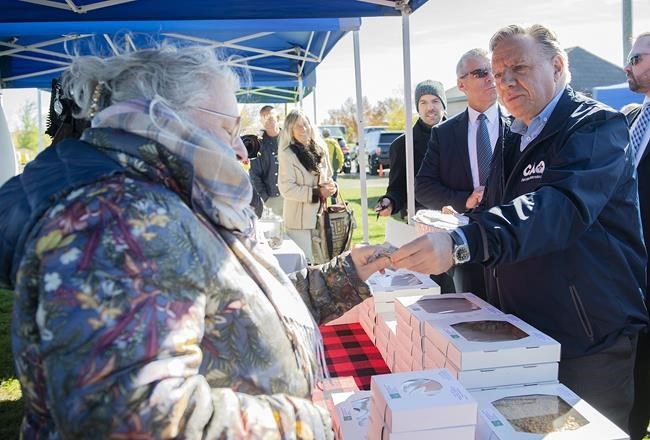MONTREAL — Quebec's major party leaders made one final appeal to voters on the eve of Monday's general election as polls continued to show François Legault's party with a considerable lead over his adversaries.
A poll on Sunday presented a picture that was relatively unchanged since the beginning of the election: the Coalition Avenir Québec far in the lead, with four other parties in a pack battling for a distant second.
The web survey results released Sunday for Quebecor media properties Journal/TVA/QUB has the CAQ at 38 per cent support, followed by Québec solidaire, the Liberals, the Conservatives and the Parti Québécois, each with 14 to 17 per cent. The poll cannot be assigned a margin of error because respondents were selected from an online panel and not at random.
Legault, who was campaigning in Montreal and the Eastern Townships on Sunday, suggested his party was hoping to flip some traditional Liberal ridings to CAQ colours in his quest for a second majority government.
As he toured a market in Magog, 120 km east of Montreal, Legault was approached by a citizen who suggested the party could win a tight three-way race in the Liberal stronghold of Verdun, in Montreal's southwest. Legault's party won only two ridings on the island of Montreal in 2018.
"We can win that!" he said. "We'll win, it's super."
He began in day in the Maurice-Richard riding in Montreal, which was held by the Liberals until the sitting legislature member was ejected from caucus over a formal complaint of workplace harassment.
Parti Québécois Leader Paul St-Pierre Plamondon, on the other hand, conceded that a CAQ majority victory was appearing more and more likely. In a seeming admission that he's unlikely to become premier, he pitched his party as the best choice to present a "strong opposition" to Legault on issues such as French-language protection.
St-Pierre Plamondon, whose strong campaign is credited with helping his party rise in the polls, urged would-be Legault voters to consider switching their vote.
"To sum it up, I'd say the CAQ doesn't need your vote, but independence, the defence of French, the defence of our regions, yes," he said at a campaign stop in the Gaspé region.
Gabriel Nadeau-Dubois of Québec solidaire spent his day in Montreal, where he attacked Legault for dividing Quebecers with his controversial statements on immigration.
Last week, Legault rebuked his immigration minister for claiming that 80 per cent of immigrants to the province "don't work" or speak French, and the CAQ leader faced heat of his own for saying it would be "suicidal" to the Quebec nation if immigration levels were raised.
Several people have come up to Nadeau-Dubois on the street to tell him how much they'd been hurt by these comments in recent days, prompting the Quebec solidaire leader to call out his rival for harming the province's social cohesion.
"My message to (immigrants) is: I won't let you down, I'll be there for you," he promised.
Liberal Leader Dominique Anglade began her day defending the decision to spend her final weekend campaigning in remote regions of the province where her party is polling in third.
After spending time in Gaspé and Îles-de-la-Madeleine on Saturday, Anglade headed to the northern Quebec village of Kuujjuaq on Sunday to campaign alongside her candidate in the Ungava riding.
She told reporters she wants to show her party is a presence all across the province.
"In Quebec, every vote counts," she said.
Conservative Leader Éric Duhaime began in Laval before heading to the Quebec City-area riding where he's hoping to win a seat.
Duhaime told reporters Sunday morning that he believes the biggest accomplishment of his campaign will be in encouraging people who don't normally vote to cast a ballot.
"I think the real victory of the PCQ is that we'll have greatly contributed to raising the turnout," he said, noting advance voting numbers were high in ridings where his party is competitive.
Under Duhaime, the Conservative Party of Quebec has grown from winning less than two per cent of the popular vote in 2018 to polling in the mid-teens. It's unclear, however, whether that support will be enough for his party to win any seats in the 125-seat legislature.
This report by The Canadian Press was first published Oct. 2, 2022.
With files from Johanna Pellus, Stéphane Rolland, Frédéric Lacroix-Couture and Patrice Bergeron
Morgan Lowrie, The Canadian Press



